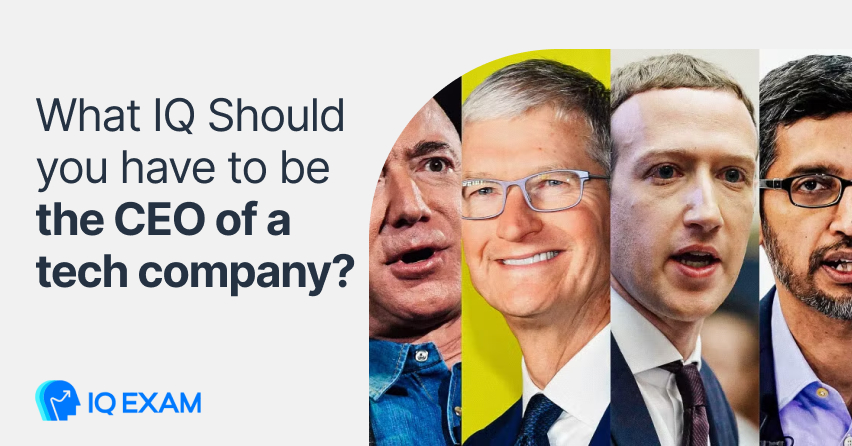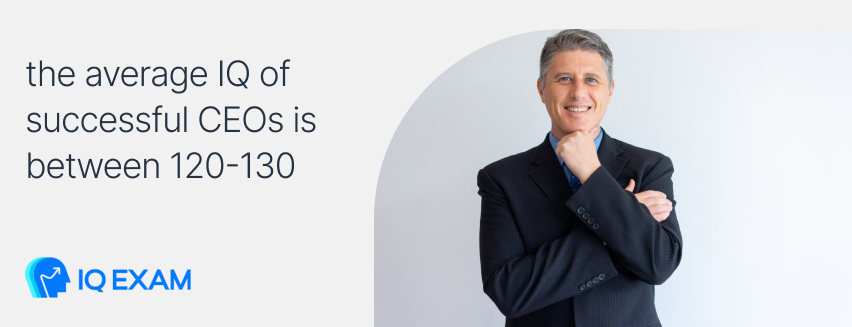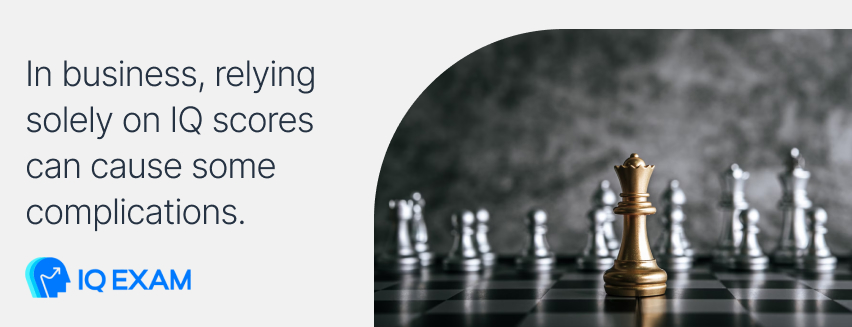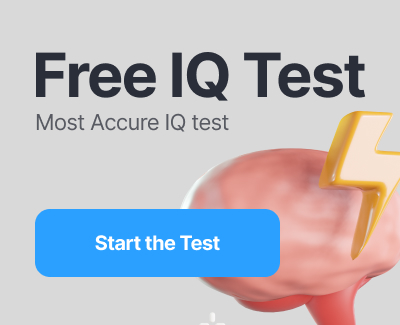
Intelligence Quotient or IQ measures a person’s ability to comprehend and learn information and use that information in real-case scenarios for solving problems with critical thinking.
But, IQ doesn’t only emphasize an individual’s general knowledge; it will measure a person’s problem-solving skills, statistical learning, pattern identification, and verbal understanding abilities.
To obtain an accurate IQ score, you must take reliable tests designed by a professional or by expert companies that conduct IQ tests. These tests can calculate your cognitive ability and predict an individual’s future accomplishments, such as education level, income, job performance, health, and life expectancy.
CEOs are often some of the most intelligent people. Still, during challenging times, they need to address their IQ and EQ to lead, make adjustments, create relationships, and ensure support with the employees and significant shareholders more effectively.
Considering the average IQ of most groups of people, which is between 100 to 110, many researchers suggest that the average IQ of successful CEOs is between 120-130.

CEOs have different characteristics, such as strong leadership, communication, and team management skills, which is valuable for companies, and their cognitive ability is also crucial for the organization,
A related article by Harvard Business Review pointed out three aspects that make up a high-potential employee: ability, social skills, and drive. “Ability” implies an individual’s cognitive ability or IQ.
Ability refers to a CEO’s cognitive ability or IQ level, which is the ability to solve complicated problems and gain necessary skills and knowledge that IQ tests can measure.
A good CEO should be aware of a business’s complex process, instruct the team, and
hand out tasks to team members appropriately.
What is the correlation between IQ and success in business?
IQ tests have been used since a long time ago for measuring a person’s intelligence level as an evaluator of their success. As a result, many businesses need employees or potential candidates to take an IQ exam as a part of the hiring process.
Many people consider IQ scores as insignificant numbers, but as a matter of fact, they can be crucial for some groups of people. For instance, a child’s IQ group can determine if they belong to a specific education plan or if someone wants to join the army; their IQ score can be considered one of their qualifications.
IQ score is one of the critical elements of measuring a person’s intelligence level. The IQ test was first designed to identify students who need additional educational help. Gradually, this test recognized people with higher intelligence than average intelligence.
IQ also matters in the business world. An IQ score between 0-200 can predict an individual success in the real world to some accurate scale. Your IQ score can provide some information about your cognitive abilities to a CEO or hiring manager, but it doesn’t offer them any information about your emotional intelligence or creativity.

In business, relying solely on IQ scores can cause some complications. The problem is not with what IQ scores can measure because the cognitive ability is vital for many professions. The real issue is with what IQ tests can’t measure.
To solve complicated business problems, you need to identify the problem itself, gather information, offer practical solutions, and assess them based on your experience and knowledge.
A recent study suggests that the most influential leaders have an IQ of around 120. The average IQ score is 100, and these leaders are usually above the average. But this score can indicate that IQ score can affect a CEO’s and company’s success.
Because leaders with high IQs are problem-solvers with creative thinking who can think productively to find the best solution based on the situation. Intelligent leaders can evaluate the advantages and disadvantages of complicated situations and make unbiased decisions.
High IQ and EQ can make the best CEO
A leader needs IQ and EQ because balancing these indicators is vital to a CEO’s success. Emotional intelligence has come to attention in many industries over the last few years. EQ evaluates a person’s ability to recognize and identify emotions, and it is part of a manager’s skills, which is crucial for team management.
Strong EQ can help CEOs create exceptional communication, engage more people on the job, and make more attentive decisions. A CEO with high emotional intelligence lead team members to a higher level of development, listen more, use strategic thinking, and listen to employees’ concerns and try to resolve them.
A CEO needs a high level of cognitive intelligence next to a high level of emotional intelligence to become successful and help the company accomplish its goals.
Leaders need IQ to become successful, but a very high IQ score can influence leadership ability negatively because other employees might not understand the CEO’s thoughts and ideas.
IQ is a better factor than EQ for detail-oriented CEOs, especially those concentrating on achieving particular goals. CEOs with the highest level of success are the ones with similar IQs to their team members.
The role of Emotional intelligence in a CEO’s success
Emotional intelligence refers to a person’s capability to understand, manage, and use emotions for productive management, successful communication, and overcoming challenges.
People with high emotional intelligence can change their behavior based on the situation and, simultaneously, are aware of their own and other people’s emotions. The central concept of emotional intelligence focuses on empathy because it is connected to ideas of social and self-awareness.

As a result, high EQ is essential for business success. Because CEOs need to understand that customers usually buy emotions and not products. On the other hand, leaders mostly move forward based on passion than logic.
A CEO should be able to get back on his feet after facing a failure, understand customer behavior, and make changes to products or services based on customers’ needs and demands. A CEO needs high EQ and a high IQ to accomplish these goals.
CEOs should think beyond just being smart.
IQ is genetic, and people can be born with it. But you can learn, improve and develop EQ. As a result, EQ can be used in different business concepts and guarantee the company’s vision more than IQ, which has a more limited role.
A successful business needs management and productive communication. A CEO needs to have the proper emotional intelligence to recognize emotions and create successful communication.
CEOs should improve their EQ.
There is no doubt that EQ is necessary for leaders to make a business successful. There are different strategies that CEOs can use to improve their EQ. Leaders can learn, improve and develop their EQ by following methods: Read as much as Possible Reading about other people’s success can help leaders identify different traits and skills needed to reach business success.
Also, reading books can help leaders imagine themselves in different situations or characters. This method can help leaders to improve their empathy, social awareness, and flexibility in different situations, which is essential in every business.
Identify and apply Empathy.
Empathy seems simple, but it has a crucial role in improving your EQ. So, use empathy in every part of your daily life, and practice it with your friends, family, employees, and even new people you meet. Monitor their body language and tone to identify their feelings about a situation.
Intelligent people can gain more success, but IQ can’t guarantee success alone. A CEO needs more than that to motivate, encourage and affect team members. At this point, we can completely understand the importance of EQ next to IQ for a successful leader.
Skills vs. high IQ for CEO
A high IQ is a privilege in the world we live in. Intelligence is the most crucial factor in evaluating and predicting life outcomes. But an individual’s success in life doesn’t depend on IQ alone.

Individuals who have higher levels of intelligence can have higher incomes. Still, without social and emotional skills, their success might be short-term, or they might face limitations in achieving success.
A high IQ allows you to progress but is not the only element you need for success. Many CEOs have a high level of intelligence, and their IQ scores are above average. But having a high IQ score doesn’t necessarily mean that a CEO will have the answer to all business problems.
Successful leaders must improve their learning capacity, adaptability, and creativity to deal with complex business problems, communicate with their tea, and develop innovative and practical solutions.
As a result, intelligent CEOs also need to extend their skill set and try to listen more instead of speaking, observe their environment, do trial and error, get back on their feet in case of failure, and keep moving toward the company’s goals.
Therefore, CEOs need to think beyond their intelligence and improve the most critical skills required for every leader. Next to the high level of intelligence, these skills can create the chief executive officer that every company wishes for. The most important CEO skills are:
Communication
IQ level doesn’t influence an individual’s communication skills. People might have difficulties communicating with intelligent people. For instance, a CEO with a high IQ should know how to deliver ideas to the employees in a way there can understand and communicate.
Transporting information and ideas to team members in a complicated language will only discourage and confuse the employees. They might think the CEO is only trying to prove that he is smart, and we are not! Communication skills can engage more people in the conversation and make them feel valued.
Organizational awareness
Intelligent CEOs with organizational awareness skills have a higher chance of success in their business. Identifying people’s emotions and predicting how they might act in specific situations will help them strategically deal with dilemmas and challenges and eventually motivate other employees. A CEO can develop this skill by listening well, asking more questions, and creating more integrity.
The ability to learn, listen and adapt to changes
As a CEO, you can always ask for help from professional consultants and outside experts to give you feedback and comments about how you can improve yourself as a leader, personally and professionally. By receiving and reading reviews about your performance, you can find information about the obstructions blocking your path to improving productivity. By communicating with shareholders regularly, you can get insights into the issues or concerns your customers have, and you will be able to offer innovative products, services, and solutions to your customers.
Ethics
CEOs should need robust work ethics to create a healthy business culture. Good ethics can bring a good reputation for the company. When clients, customers, investors, and employees confirm a business performance, that company has a higher chance to progress, become successful, and accomplish its goals.

A CEO with a work ethic can create a happy work environment because employees are more motivated and inspired in such an atmosphere. An excellent ethical workplace will help CEOs coach their business through critical times, prevent crises, manage conflicts, and make wise decisions.
Consistency
CEOs should be consistent in delivering business outcomes. A CEO should be creative and sharp but also realize a line between authenticity and negligence. Because all the team members always look up to their CEO. From a trainee and a newly hired employee to shareholders and board chairpersons, they expect results and steadiness from the leader.
The World’s Most intelligent CEOs
Based on the annual list of the world’s most powerful CEOs published by CEOWORLD magazine, some of the most intelligent chief executive officers are as below:
- 1st place goes to Tim Cook, Apple CEO
- 2nd place goes to Satya Nadella, chief executive officer of Microsoft Corp.
- 3rd place goes to Sundar Pichai of Alphabet (Google).
- 4th place goes to Andy Jassy, the CEO of Amazon
- 5th place goes to Elon Musk, the CEO of Tesla
- 6th place goes to Mark Zuckerberg, the founder, and CEO of Facebook
- 7th place goes to 90 years old Warren Buffett, the CEO of Berkshire Hathaway
- 8th place goes to Dr. C.C. Wei, the CEO of TSMC Taiwan.
- 9th place goes to Jensen Huang, the CEO of Nvidia
- 10th place goes to Alfred F Kelly Jr., the chief executive of Visa Inc
Final thoughts
CEOs with high IQs have many constructive characteristics, such as problem-solving, empathy, and social skills. These qualifications can help CEOs to provide productive solutions to problems, work excellently with team members and create strong relationships.
A high IQ can accurately predict life outcomes, but there is no guarantee that it can provide you with 100% reliable information about future success. For example, an individual with a high IQ working in a simple job with no complex responsibilities might not have the chance to grow because the job doesn’t motivate them, and they are not interested in their role.
Of course, IQ is a crucial privilege for thriving in life, but it might not be the primary element to help a CEO succeed in business. Emotional intelligence can evaluate a CEO’s success more reliably because it can help leaders to solve problems according to social and self-awareness.
As customers are the most important assets of every business and can’t survive without consumers, understanding customers’ needs and concerns and altering products and services based on their requirements can increase a CEO’s chance of getting a business closer to its goals.
